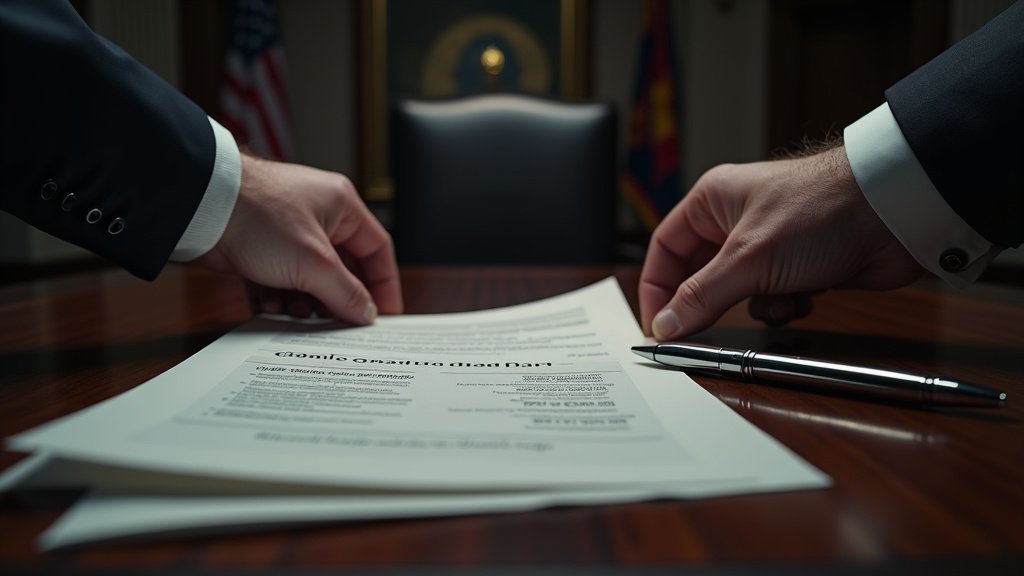WASHINGTON, D.C. – February 18, 2025, saw a series of significant and controversial actions from the Trump administration, spanning judicial appointments, personnel changes within key federal agencies, and immigration enforcement policies. These developments collectively paint a picture of an administration actively reshaping the federal workforce and pursuing assertive policies, drawing both support from allies and sharp criticism from opponents.
Contested Nomination for Top D.C. Prosecutor Role
Among the most debated moves of the day was President Trump’s nomination of Ed Martin to be the top federal prosecutor in Washington D.C. The role holds significant sway over federal cases in the nation’s capital, including those related to the January 6th events. Martin is a figure well-known for his deep involvement in conservative activism. He was an organizer of the Stop the Steal protest movement and has represented individuals charged in connection with the January 6th insurrection.
Martin is also widely described as a “longtime anti-abortion activist.” His publicly stated positions include advocating for a national ban on abortion and, notably, supporting the jailing of women who undergo abortions. The selection of a nominee with such a specific and prominent activist background for a chief federal law enforcement position has immediately sparked debate regarding potential political motivations and the future direction of federal prosecutions in Washington D.C.
Scrutiny Over Federal Agency Personnel Changes
The day’s events also highlighted ongoing concerns about personnel changes within federal agencies, particularly those touching upon the interests of prominent business figures like Elon Musk. The Trump administration, alongside Elon Musk himself, faced criticism following the firing of hundreds of workers at the Federal Aviation Administration (FAA). These terminations reportedly occurred after a SpaceX team visited the FAA’s air traffic control command center in Virginia, raising questions about the potential influence of private interests on agency staffing decisions.
Further personnel shifts were reported at the Social Security Administration (SSA). Michelle King, the acting head of the agency, resigned. Her resignation followed her refusal to grant access to sensitive personal information belonging to hundreds of millions of Americans to Elon Musk and a group identified as the “Department of Government Efficiency.” The nature of this group and the scope of the requested data access remain points of concern for privacy advocates. Reports indicate that the new acting head appointed to lead the SSA is a low-level official who has previously expressed praise for “Doge,” an apparent reference to the cryptocurrency Dogecoin, adding an unusual dimension to the leadership change at the critical agency.
The administration’s broader “purge of federal workers” reportedly also extended to the Food and Drug Administration (FDA). Approximately 20 staff members were targeted within the FDA’s neurological and physical medical devices division. This division is directly responsible for reviewing medical devices, including those developed by Elon Musk’s company Neuralink. Critics argue that removing staff from a division tasked with regulating a company linked to a figure seemingly favored by the administration could raise questions about regulatory independence and oversight.
Guantanamo Deportations Raise Human Rights Concerns
In a significant development concerning immigration policy, three Venezuelan immigrants were deported to the U.S. naval prison at Guantanamo Bay, Cuba. This transfer occurred despite the individuals having a temporary restraining order in place that should have blocked their transfer. This action is part of a recent pattern of deportations by the administration, which has reportedly sent at least 150 Venezuelan immigrants to the controversial US naval prison in Cuba.
President Trump has publicly claimed that his administration is targeting “the worst of the worst” with these deportations to Guantanamo. However, reports counter this assertion, indicating that many of the individuals deported have not been convicted of violent crimes. The transfer of immigrants, particularly those who may not have been convicted of serious offenses and in defiance of legal orders, to a facility primarily used for terrorism suspects has drawn sharp criticism from human rights organizations and legal experts.
Looking Ahead
The events of February 18, 2025, underscore the administration’s assertive approach to shaping the federal bureaucracy and enforcing its immigration agenda. The controversial nature of the appointments and personnel changes, coupled with the human rights concerns raised by the Guantanamo deportations, suggest that these actions will continue to be subjects of intense scrutiny and debate in the days and weeks ahead.













